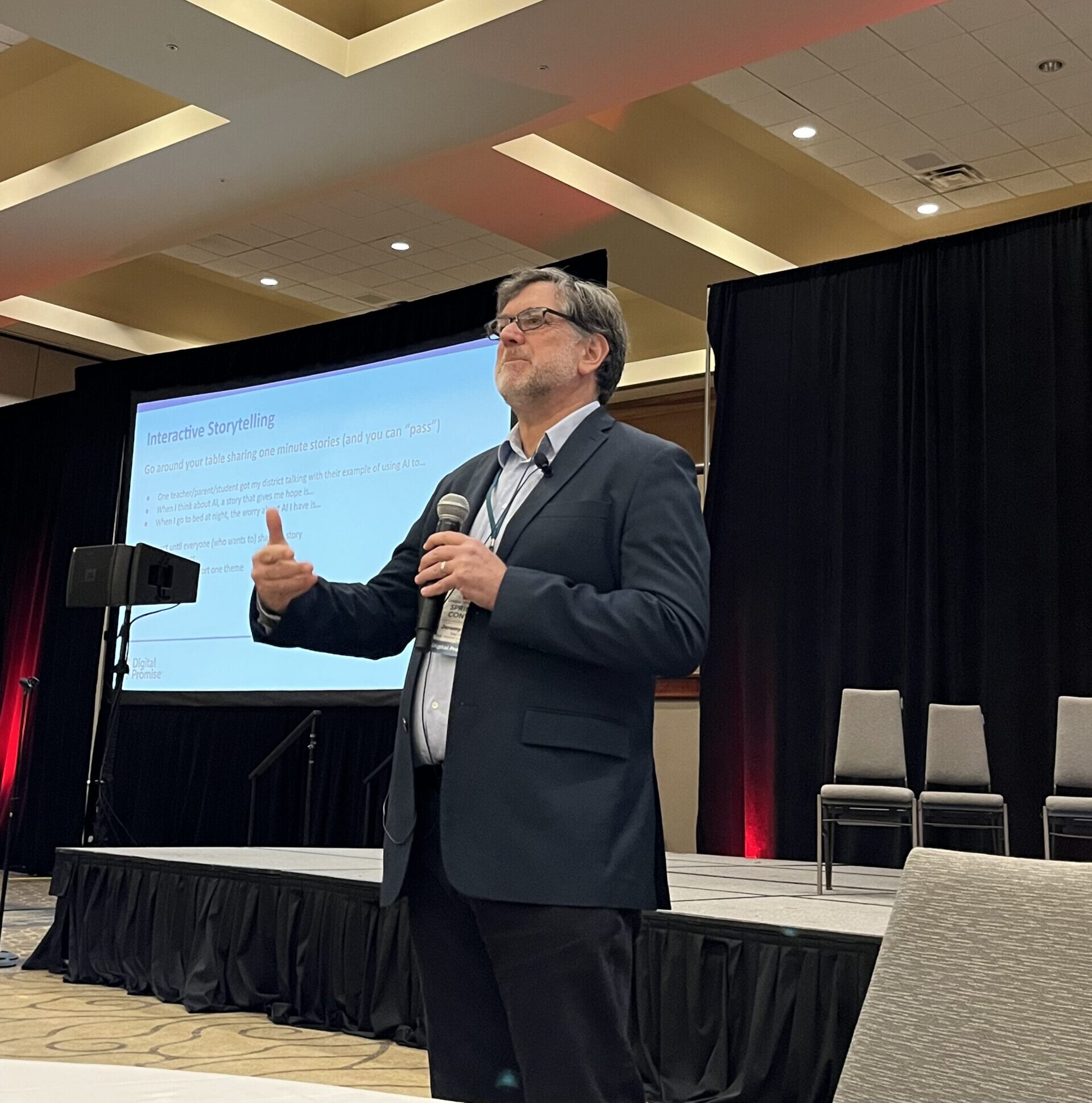By Jeremy Roschelle and Pati Ruiz
Together we facilitated a session on “Understanding and Leading with AI for Teaching and Learning” for 75 school superintendents and educational leaders at the spring convening of the League of Innovative Schools in Birmingham, Alabama. The participants rapidly moved the conversation from background knowledge and experiences, to eliciting opportunities, risks, and then to a call for action.
We briefly recapped a prior session with the League—a Digital Promise-hosted organization that brings together innovative leaders from more than 150 school districts serving 4.4 million students. That prior session explored the impact of using generative AI for writing and was held in October 2022, just a month before ChatGPT launched worldwide. At the time, superintendents shared their experiences with prior writing support technologies in the classroom and were cautiously optimistic that AI could save teachers time and enhance instruction—and yet in prescient discussion, they also raised concerns about cheating that would soon arise in broad national discussions about the newly emergent chatbot tools.
Throughout the conversation in Alabama, we started by eliciting educator’s recent experiences and heard powerful examples:
- When a coach was unable to run basketball practice, their 10 year old child used ChatGPT to design a coaching plan for a parent to use so the practice could go on as scheduled.
- A school found that using generative art AI tools could enable greater inclusivity for students with disabilities.
- Another school leader used ChatGPT to generate an initial analysis of scholarship applications they had received which allowed them to extract details they needed to sort the applications more quickly and efficiently.
We shared how the work of the Engage AI Institute is exploring narrative-centered learning—learning grounded in stories, plots, and characters—and how we can use generative AI to enable educators to customize narrative-centered experiences to build on the strengths of their specific communities of students. We also shared how concerns arise in our institute’s work and that one way we are responding to the need to address ethics and equity is by forming a Practitioner Advisory Group to guide the Institute.
The school leaders also articulated their concerns. Privacy and data security remain important to school leaders, with new concerns arising around bias. School leaders were worried that if AI enabled tools were found to have biases, then trust would decline and it would make leveraging the tools harder and could spark controversy in their districts. They were concerned about existing inequities in access to digital technologies and tools, and that differences in access (including differences due to “bans”) could present further structural barriers for students. They were strongly concerned with the pace of change and the need for policies, guidelines, and guardrails to keep up.
“When we look at personalization products of the last decade, they were deficit oriented. This new generation of technologies could be asset-based.” – Jeremy Roschelle
While discussing Digital Promise’s new page of resources about AI for educators, the audience highlighted their appreciation for our Glossary of Artificial Intelligence Terms for Educators. This guide can help guide their educators to more thoughtfully implement AI tools in their classrooms and with their students. While Digital Promise continues to create resources that support educators, researchers, and developers, we also want to utilize the voice of those within the League of Innovative Schools to co-create with us.
As facilitators, we were excited to hear the assembled school superintendents and leaders generate their own call to action. The school leaders see a strong need for districts to work together to develop policies for adopting, using, and monitoring AI. They also want to share successful use cases and examples nationwide. Underlying this, district leaders see a need for more resources and support for informing and involving their educators about both the opportunities and risks of this fast moving area of emerging technology.
For more information on the League of Innovative Schools and the work they’re doing to support forward-thinking education leaders from across the navigation, check out their website.

